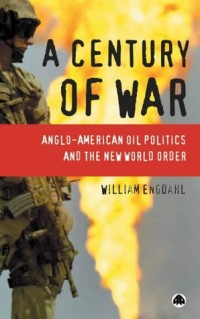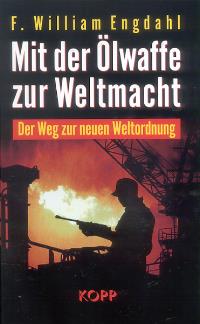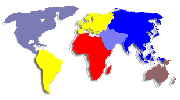|

China lays down the Gauntlet
F. William Engdahl
Behind Bush II’s ‘War on Tyranny’
F. William Engdahl, 12 February 2005
beiträge auf deutsch 
Ein Neues “American Century”?
Der Irak und die heimlichen Euro-Dollar-Kriege
Von F. William Engdahl, 16.6.03
 ÖLGEOPOLITIK ÖLGEOPOLITIK
The Hidden Agenda
behind Cheney`s
Speech 
New Release of ‘Century of War - Anglo-American Oil Politics and the New World Order’ by William Engdahl
“This is the only accurate account I have seen of what really happened with the price of oil in 1973. I strongly recommend reading it.”
Sheikh Zaki Yamani, former Oil Minister of Saudi Arabia
Die strategische Achillesferse der USA? 
Irak und das Problem der schrumpfenden Ölfördermenge
Iraq and the Problem of Peak Oil (English) 
Von F. William Engdahl (*)
Is a USA Economic Collapse due in 2005?
By F. William Engdahl 
Ein Mezzogiorno
von Erfurt bis Brest-Litowsk? 
Gedanken zum Aufbau Mittel- und Osteuropas 
American Power:
A great debate has just begun / What are neo-conservatives?
/ By F. William Engdahl (Nov. 2002), author of Mit der Ölwaffe zur Weltmacht 

Mit der Ölwaffe
zur Weltmacht
Der Weg zur Neuen Weltordnung
von F. William Engdahl
Neue deutsche Ausgabe 
Mit der Bahn von
Berlin nach Bagdad
Auszug aus “Mit der Ölwaffe zur Weltmacht” 
American Exceptionalism
Serious Distortions of the
New Economic Era /
World Finance and Monetary Designs
after WW I /
Montagu Norman and Benjamin Strong
By F. William Engdahl 
“After 1914, under the guidance of a Morgan man, Benjamin Strong, first and, by far, the most powerful President in the history of the New
York Federal Reserve Bank, U.S. monetary policy and capital flows in the critical years up to 1929-1931, were, in effect, guided by the Bank of England under its head, Montagu Norman. The banking capital flows
of the twelve regional Federal Reserve banks were channeled into New York under Strong's influence.
It was a lop-sided domination by New York, opposite to the original
intent of the Federal Reserve Act of 1913, which envisioned a division of powers among the regional Federal Reserve districts and the Washington Reserve Board. The Federal Reserve Act of 1913 had been
passed by Congress primarily to prevent the damaging effects of periodic banking panics such as in 1907, from causing broader domestic economic depressions.”
World finance
Argentina: Test case for a new approach to insolvency?
By F William Engdahl (January 5, 2002) 
Hunting Asian Tigers: Washington and
the 1997-98 Asia Shock
F. William Engdahl
Once the East Asian Tiger economies had begun to open up to foreign
capital, but well before they had adequate controls over possible abuses in place, hedge funds went on the attack. The secretive funds first targeted the weakest economy, Thailand. American speculator,
George Soros, acted in secrecy and armed with an undisclosed credit line from a group of international banks including Citigroup. They bet that Thailand would be forced to devalue the baht and break from the
peg to the dollar. Soros, head of Quantum Fund, Julian Robertson, head of the Tiger Fund and reportedly also the LTCM hedge fund, whose management included former Federal Reserve deputy, David Mullins,
unleashed a huge speculative attack on the Thai currency and stocks. By June, Thailand had capitulated, the currency was floated, and it was forced to turn to the IMF for help. In swift succession, the same hedge
funds and banks hit the Philippines, Indonesia and then South Korea. They pocketed billions as the populations sank into economic chaos and poverty. 
 |

|



